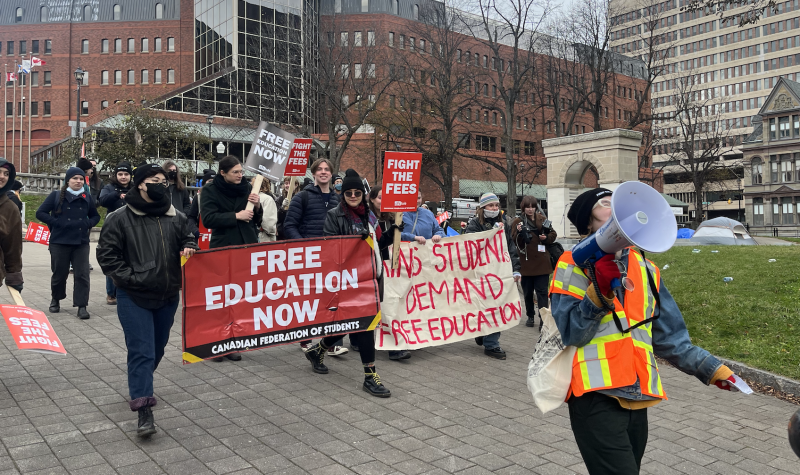Students rallied together at Grand Parade in Halifax on Wednesday to call on the provincial and federal governments to make post-secondary education more accessible.
Around 35 rally attendees heard from the Canadian Federation of Students Nova Scotia (CFS-NS), the Association of Nova Scotia University Teachers (ANSUT), Nova Scotia Director for the Canadian Centre for Policy Alternatives Dr. Christine Saulnier, and students currently struggling due to the rising costs of tuition fees.
A report released in August from Students Nova Scotia found that tuition in the province is rising at a faster rate than the rest of Canada with a 20 per cent increase in the last six years. The national average saw an increase of 3.2 per cent over the same time period.
“Nova Scotia universities receive the lowest percentage of revenue from government sources in this country,” Saulnier says. “And the second highest percentage comes from students.”
Chairperson of CFS-NS Aideen Reynolds says, “It is well past time for free education, for free housing, for everyone to have the basic necessities of life.”
International student tuition rates have also seen a rise.
“On average, international students pay 429 per cent more than domestic undergrad students,” Saulnier says.
The rising costs for international students have created a shortage for housing and jobs, Navy Nguyen, a student organizer from Cape Breton University (CBU), says.
“Many [international] students have to take out high interest loans back home or take on multiple jobs to fund their education, pay rent and put food on the table.”
The Association of Atlantic Universities 2023-24 preliminary figures show that CBU has 9100 full-time and part-time students, about 76 per cent of which are coming from overseas.
“CBU international students tripled over only five years,” Ngyuen says.
Teresa Workman from ANSUT, which represents 1400 faculty members from eight universities in Nova Scotia says the association stands with the students.
“Together, we are gathered here to work toward a system of post secondary education that is not just free, but of the highest quality and accessible to every single person who aspires to learn and grow.”
Listen to the story below:


